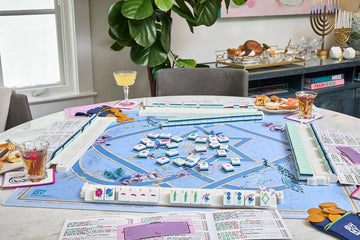Mahjong: A Game that Connects Generations and Cultures
Mahjong is more than just a game. It's a timeless tradition that crosses cultures, generations, and communities. Recently, we had the pleasure of discussing the deep-rooted connection between American Mahjong and the Jewish community with two passionate players (and OMM Mahji Mentors), Rachel Mazer and Gabby Spatt. The conversation opened our eyes to the incredible journey this beloved game has taken, and we wanted to share the stories and significance it holds for so many people.
A Personal Connection to Mahjong
For Mazer and Spatt, the game of Mahjong holds a personal and nostalgic connection—they both grew up around the game thanks to their grandmothers. It's a common story for many in the Jewish community. Mahjong has been passed down from generation to generation, or "L'dor vador" as Spatt shared, fostering bonds between family members. It's more than a way to spend an afternoon; it's a cherished tradition, an heirloom carried from table to table, year after year.
Mazer, who now lives in Birmingham, Alabama, grew up in New York. Mazer has loved Mahjong for as long as she can remember. Having grown up around the game during her childhood via her grandmother, she's deeply familiar with its fun and rich history. Spatt, who now lives in Atlanta, Georgia, shares a similar background to Mazer, but with Floridian roots. Spatt echoed Mazer’s enthusiasm for playing the game and educating others about its cultural significance.

The Rich History of Mahjong
Mahjong first came to America in the early 1900s. The game was beginning to be shared nationwide, played by wealthy families like the Vanderbilts and Astors, who had traveled far and wide. Initially popular among the elite, the game's widespread appeal dwindled around World War I. But in 1937, a group of Jewish American women created the National Mah Jongg League and revived and standardized the game to the American version that so many of us love and play today, breathing new life into it.
But before Mahjong was viewed as an affluent hobby, the game was pivotal in fostering community among Jewish women moving to suburban areas. For many, it became more than a pastime –– it was a way to socialize, form bonds, and stay connected in tight-knit circles. Mahjong nights became a tradition in many Jewish households, passed down from generation to generation—something Mazer and Spatt have both experienced firsthand.
The Cultural Significance
Spatt shed light on the fascinating history of Mahjong and its early cultural connections. Initially, the game was male dominated, but women began embracing it, dressing in traditional Chinese attire to immerse themselves in the experience. Mahjong, in many ways, became a bridge between East and West, bringing different cultures together and creating a unique space in Jewish homes across America.
A beautiful part of this story is how Jewish women used Mahjong to connect socially and give back. Following the foundation of the National Mah Jongg League, the founding women made the impactful decision to give back to the community they loved. The National Mah Jongg League has raised significant funds for several Jewish organizations –– a philanthropic tradition that continues today.
Keeping the Legacy Alive
Mazer and Spatt’s passion for preserving the game's history was palpable throughout the conversation. They emphasized the importance of ensuring that the Jewish roots of Mahjong are remembered and celebrated. As modern players continue to embrace this game, it's essential to acknowledge its historical context and the cultural significance it holds for so many communities. They aim to ensure that future generations understand and appreciate the game beyond its surface-level appeal. They recently started Mahji Mazels, a content program to continue sharing the connection between the game and the Jewish community.

A Game that Fosters Connection
Mahjong isn't just a game— it's a connection—a way for people to come together, share stories, and honor traditions. For the Jewish community, the game holds deep significance, not only as a beloved pastime but also as a testament to the strength of their bonds, both familial and cultural. From the days when women would gather around tables dressed in traditional Chinese attire to the modern resurgence and twist on this timeless classic of the game, Mahjong has remained a beautiful thread woven through the fabric of Jewish life.
Mazer and Spatt’s stories remind us of the importance of keeping traditions alive and honoring the past while embracing the future. Whether through philanthropy, social connections, or simply playing with friends and family, Mahjong brings joy, history, and togetherness to every table it touches.
